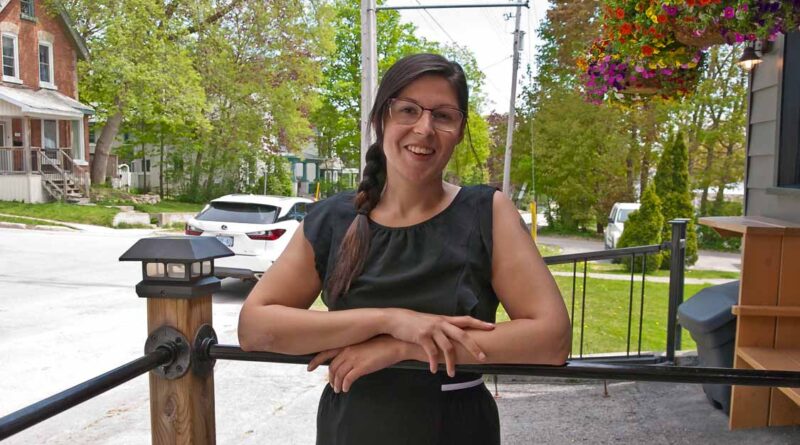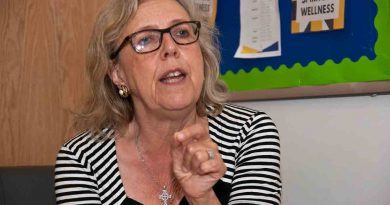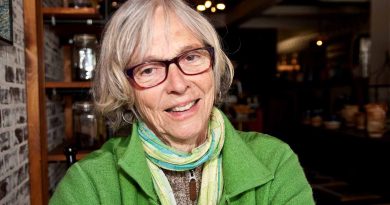Krystal Brooks, Round Two
By John Swartz
SUNonline/Orillia profiles candidates from each party in the forthcoming provincial election. Each candidate was asked the same set of questions. All candidates were invited to participate, however Mark Douris of the New Blue Party and Jill Dunlop of the Progressive Conservative Party of Ontario did not make arrangements to meet with SUNonline/Orillia.
By John Swartz
Green Party of Ontario candidate Krystal Brooks is running her second campaign for public office in as many years. She was the party’s candidate in last year’s federal election. She decided to run again because there is one issue, of several, that is of particular interest to her and it’s under provincial jurisdiction.
“There’s a lot of reasons. The biggest one is the water, the Alliston Aquifer, the lakes. Rescue Lake Simcoe, they do amazing work.”
Brooks is First Nation and her Native name is Biiwaabik Nibi Kwe, which means Stillwater Woman, and she is of the Turtle Clan. She acknowledges that has a role in her interest in water quality in Simcoe County.
Brooks is 29 years old, has two children and her nephew lives with her.
“I’m from Rama, I was born in Orillia. I lived here most of my life,” she said. “I was in foster care, I was adopted. Until recently I never actually lived on the reserve.” She is not sure of her lineage. “I know as far as my grandmother, my grandfather I have no idea. A lot of my ancestors lived in the Toronto area.”
She didn’t finish high school, which doesn’t hold her back from pursuing public office. In fact, she thinks that’s one of the reasons the party decided to make her their candidate.
“I was almost not a candidate at all last year. The Green Party of Canada and Ontario, both have made a really progressive decision in regards to me. I promise you there has never been a candidate like me. I say that because I don’t have an education I can impress you with, I don’t have a resume I can impress you with. What I do have is lived experience,” Brooks said.
“The Green Party of Canada was actively seeking out equity seeking (women, minorities) candidates last year. When I threw my name in there I wasn’t the kind of candidate they were looking for. I made it, but I’m not a token Indian and that has been a relevant issue in my life, that I am not a token Indian and a lot of people want a token Indian. I have never been that. There were a lot of people who advocated for me at the very top. I have guesses, but I still don’t know who did that. They made a decision to take a chance on me and I ended up doing 50% better than the national average for Greens across Canada.”
“With the Green Party of Ontario, when they were vetting me, they made the same decision. I know they were aware of what I did with the Green Party of Canada, but the Green Party of Ontario still made a decision that was very progressive to choose lived experience over work and education experience. I don’t have all of the answers. I’m 29 and I’m still learning as I go. I really think there’s nothing wrong with that because the moment I stop learning, the moment I stop opening myself up to learning I shouldn’t be in politics.”
The federal party also named Brooks to a couple of their committees. She is now co-chair of the Ombuds and Appeals Committee and the Ontario representative of the Federal Council.
Learning is a topic raised with each candidate, as in, If elected, how do you acquire the information you need in order to make informed votes?
“I have a lot of different sources. It’s such a broad mix. I think sometimes it does help to get a sense of what’s being said on the far right and what’s being said on the far left and it kind of helps me navigate what I should be looking for in between. I think both sides matter and both sides have an opinion and there’s a reason why they have that opinion. Both believe they are right and both believe the other is wrong,” Brooks said. Failing that, the next best thing is to ask someone directly for information.
“I have a variety of sources. Stephen Makk is a great one. Erik Schomann, he’s another good source. I read probably more than most. There’s only one person I’ve ever met that reads more than I do.”
She obviously likes the party platform, but there is one thing she is excited about.
“Definitely the ODSP plan, I think that’s more than reasonable, doubling ODSP, it’s currently at $1,169, so Mike Shriner (party leader) wants to double that. There’s lots of really good things in the party’s platform.”
Healthcare
This is a big topic with many areas to investigate. All candidates were asked – does privatization make healthcare better? as a starting point.
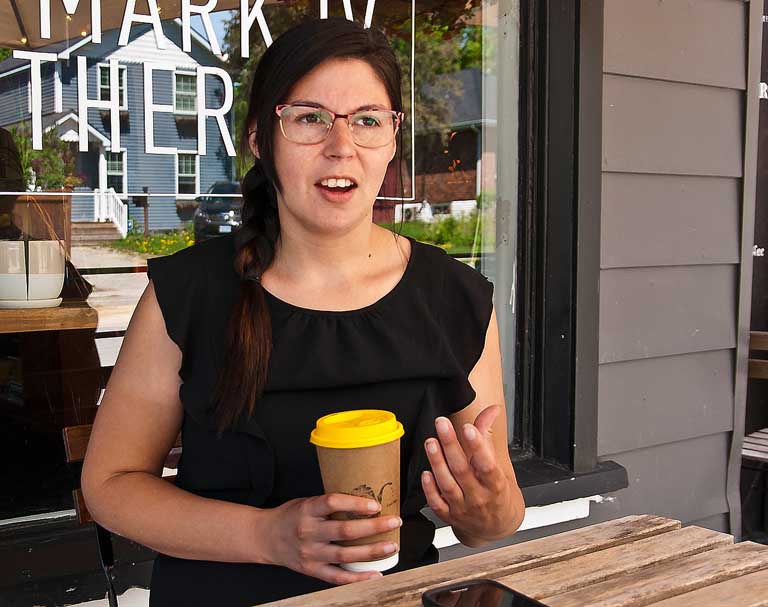
“I don’t believe it does, but I know there are people who do. There is a benefit to people, profit. Beyond people making a profit I can’t see any benefit to people using that system,” Brooks said.
“Investing more, particularly mental health and long term care. Those are big ones in our platform. Putting less money in for-profit homes and putting into staying at home and allowing people to age at home.”
A big issue is staffing. It’s no secret there is a nursing shortage, but many doctors, PSW workers and others are leaving the healthcare field. Low pay is certainly a factor, as is Bill 124 (Protecting a Sustainable Public Sector for Future Generations Act, 2019), but the lack of respect from the government and management and working conditions because of low staffing levels have also driven people from employment in this field.
“Respect for workers and actually investing in them, there’s no incentive holding them there, absolutely none. I think we talk about encouraging more people to join that workplace and once again there’s no incentives. I have a friend who is a PSW and has no benefits whatsoever.”
Another issue particular to Orillia is the work being done to build a new hospital. Many people in the community do not want to see a hospital built in the West Ridge, or anywhere west of Highway 12. The crater left behind by removing the hospital and other related offices and business which will surely follow wherever the hospital is built would be detrimental to the health of Orillia’s economy and defeat the work done by Orillia council to strengthen the downtown core.
However, people sitting in boardrooms in Toronto making the decision don’t live here and don’t care about what is best for the community, other than building a new hospital the least expensive way it can be done. Obviously construction costs will be lower building in a farmer’s field, and the various and many other costs to other parts of the community don’t often count (see building the OPP Detachment outside the downtown core)
Some councillors and other community leaders have already stated they would oppose building a hospital west of Orillia. If elected will Brooks stand up for building a new hospital in a place benefitting all parts of the community and local economy?
“Yes. That’s the biggest thing is the hospital having on this city and the city needs to have a voice in where it goes and how it happens. There’s a significant amount of, just a lack of consent in that regard. A lot of people feel it’s being forced on them.”
“What this job is, is to represent the constituents and their needs and their wants and not to represent corporate interests,” she said.
And once again, some politicians won’t let the topic of abortion go away, therefore candidates need to be asked if they ar in favour of keeping abortion legal.
“Yes, and there’s a ‘but’ there. We in Canada seem to have the impression that abortion is completely accessible for women and it’s not. We have the ability to choose, we have that right, but there are many women who don’t have access to abortion,” Brooks said.
One way politicians have found to meddle with the majority will of the country is with funding – a provincial responsibility – which limits access to abortion.
“I would have to make it further than that and make it abortion more accessible. There are places that still make you pay for an abortion. There’s one in Toronto,” Brooks said of a private clinic she knows of.
Housing
Is there another topic that touches every resident in some way? Unless you don’t need a roof over your head at least once a day, it’s hard to think another is so vital to residents.
Each candidate was also asked the same starter question – Why should corporations be allowed to own so much of rental stock (30% in many larger cities) and control prices?
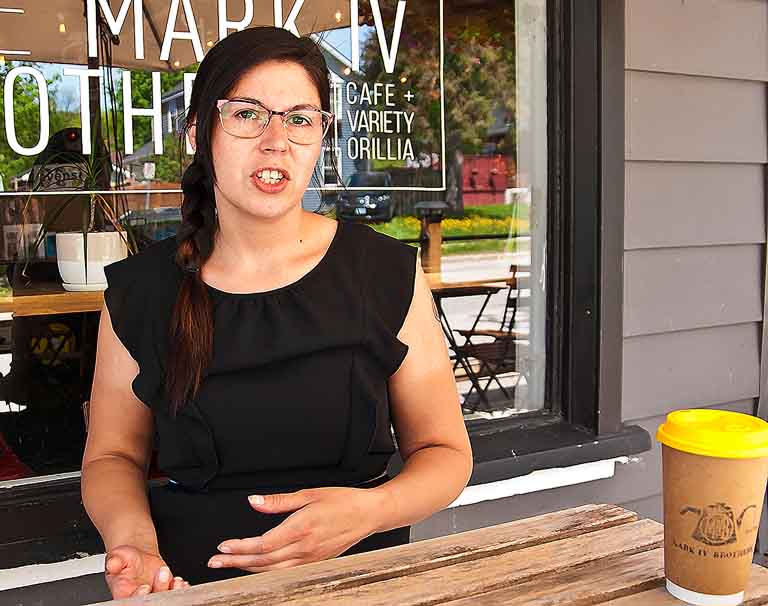
“I think putting people over profit is a really big one. When we start thinking about people first and profits second I think those things really are centralized.”
The current issue has been decades in the making, staring with the federal government pulling most of new housing funding in the mid-90s, and continuing with acquiescing to investment corporation’s demands for deregulation. Is there a fix?
“That’s what it is to them (government). It’s the biggest economy booster we have. They don’t want to fix it,” said Brooks. The Green Party also has a platform point to tackle some of the gaping loopholes which lead to creation of the housing cost crunch for renters – and buyers.
“It’s kind of similar to a foreign investors tax. We also have a vacancy tax and a multi home tax, so people own more than two homes.”
Work and Social Assistance
Recently the Ontario government cut benefits to ODSP (Ontario Disability Support Program) and Welfare recipients to levels which do not cover rents charged. Again, a starter question kicked off discussion with each candidate – why is it OK for some Ontarians to live below the poverty line?
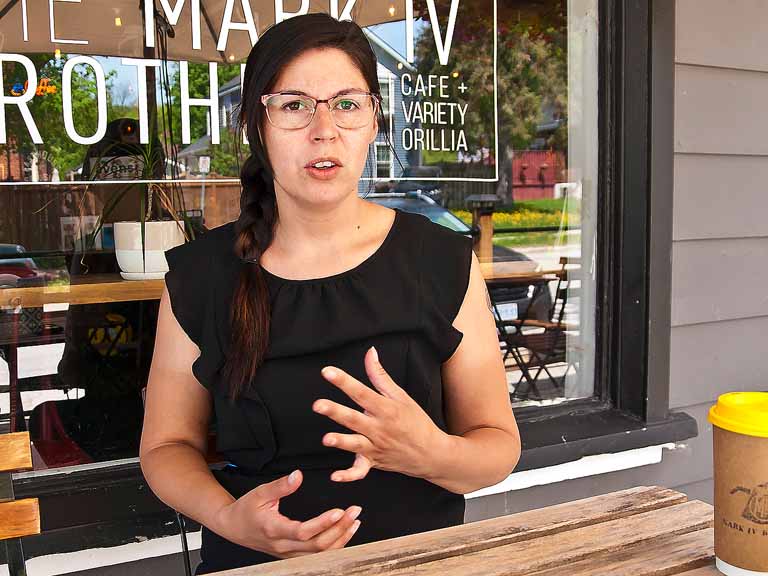
“I’ve been one of those people for a very long time. I lived on ODSP. I remember one time having to choose between groceries and medication for my mental health. Nobody should ever have to choose between those two things,” Brooks said.
“The most common argument I hear in regards to ODSP is get a job, get out there and work. Those opinions are very, but once again one of those cuts was actually to the ability to access education through ODSP. There’s no help in that regard. I think you are punishing people for utilizing that funding when they have to and it’s not an easy funding to apply for. The process is quite tricky. They’re already punishing people and forcing them to live below the poverty line and they’re doing absolutely nothing to help them change that.”
Massive unemployment is still being predicted by experts because of automation, and still government is ignoring the warnings and advice – just like they did with climate change. While not intending to focus on Universal Basic Income as has been the case with past elections, one cannot avoid it talking about the welfare of everyone. Job evaporation is happening right in front of our eyes. Of course if you don’t go to the grocery store or stop for a quick burger you might miss it.
“I think that’s already beginning to happen. I went to a restaurant yesterday in Toronto and they had one of those things (robot taking orders) and it was the weirdest thing. I don’t like them.”
“It’s (UBI) not going to solve all of our problems. I don’t like that some people believe it’s the end all and be all. It will help a lot of our problems. It’s not going to solve the opioid crisis we’re facing right now,” said Brooks. But, which came first? Does drug use follow miseries in life, or create it?
“I mean the selling, it’s not going to get drug dealers off of our streets,” she said. It’s not just drug use, but trying to survive on wages decades behind a living wage standard, a general angst many have over the state of public discourse and so many things happening it’s hard to tell which way is up all contribute to poor mental health.
“If we are not investing in mental healthcare then all of that is, a lot of the funding for mental healthcare goes to administrative staff and that’s a big issue. I don’t know any funding that doesn’t go,” to administration bloat, said Brooks.
Many don’t have hope when corporations are taking corporate welfare and then recording record profits – during a pandemic. Deregulation didn’t happen in a vacuum. It happened to the financial benefit the corporations benefitting from looser rules than what used to govern corporate conduct. In short, public policy is being driven by corporate Canada as far as many are concerned. This leads to lower funding of public institutions – often to the point of dysfunction. Only the government can control it’s spending, and often it doesn’t even know what use the money is going toward.
“It’s possible we could control the funding and where it’s going. I don’t see an easy solution to any of that. It’s gradual. It can be progressive, but not in terms of speed,” but in terms of taking steps.
Public Discourse
There are several things happening at once here. What cannot be in doubt is society is dividing along political lines. Russia may not be successful rolling tanks down country roads, but they have accomplished splitting friends and family apart along political lines.
The federal government has another divisive issue in its Bill C-11, which is attempting to curb online turmoil by extremists. As usual they aren’t listening to experts and trying to fix why the north end of the horse isn’t eating by looking at the south end.
To many the crux of the bill is viewed as a means for government to control online speech.
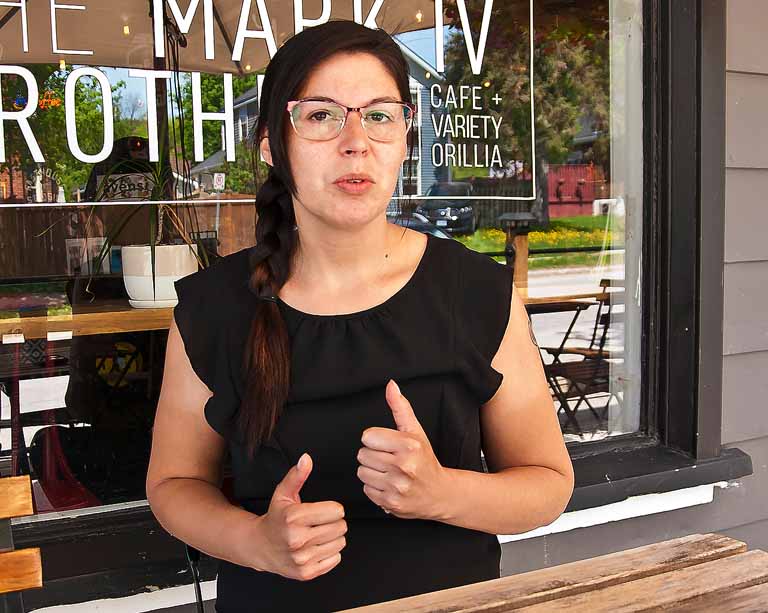
“What motivates the right wing? It’s also similar to a magnet. The right and the left both feed off of each other,” Brooks said. “First you have to define hate speech. I’m thinking more specifically along the lines of people having posts removed for saying trigger words. There’s no hate to their opinion.”
“There are genuine people out there who want to have a ‘Kill An Indian Day.’ I just saw comments like that recently. The issue is we’ve likened freedom of speech with hate. Hate is not freedom of speech and freedom of speech is not hate. Neither one coexists, but we have allowed them to coexist. Neither one is defined by the other. Freedom of speech is the freedom to state an opinion and express how you feel. Hate is infringing on the rights of others.”
There is no doubt people have been radicalized to take violent action. Many of the most recent U.S. (where our extremism is copied from) mass shootings have been done by people linked to extreme right wing groups and influence. This is known from online postings by criminals before they committed their crimes – and as usual no one did anything about the pronouncements.
“Nine times out of ten if a school were to experience a shooting, the school itself would likely have a list of suspects. We ignore them, we neglect them and we fail them.”
While Brooks understands something needs to be done, what and how much are still unknown. She likens it to an artist’s dilemma.
“When I’m painting, when I’m finished and I’m really happy with the way it looks, but something inside of me keeps fiddling with it. That is what is happening here. People are trying to fix the issue and they keep stroking over everything over and over again until it’s perfect and it will never be perfect.”
Highways Or Public Transit?
New highways, or expanding the number of lanes does not solve congestion in metropolitan cities. Try finding a transportation expert who disagrees with that. Go ahead, we’ll wait. Let’s save you the trouble. Adding more driveways doesn’t produce more room for traffic, it tends to produce more traffic, leaving the same amount of congestion.
Candidates were asked if it’s better to spend billions of dollars on two new highways, extending another, and expanding a fourth, or put the money into better transit, especially intercity transit.
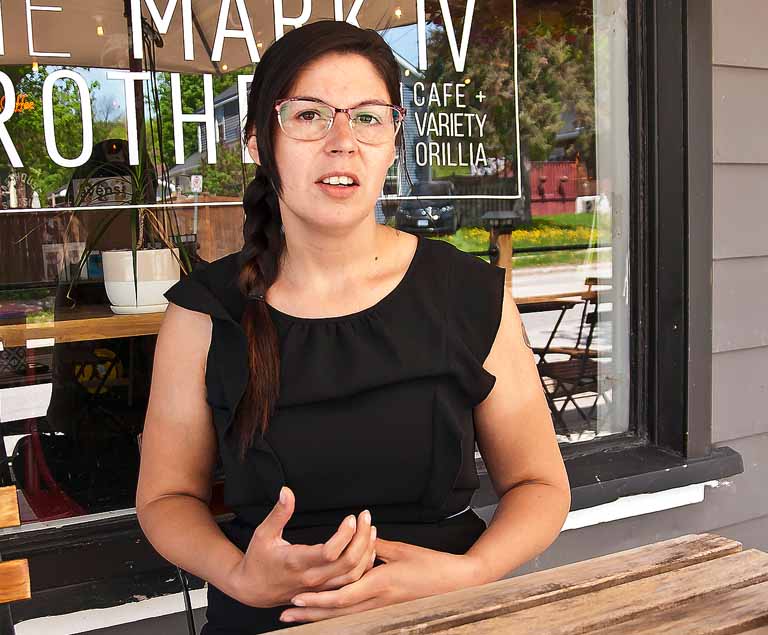
“I do believe that. In other places where they have invested in their transit system, cut costs and all these other wonderful things, they didn’t actually see much of a decline of cars on the road. It doesn’t matter where you look there are holes to poke. You can invest in electric vehicles, which are great, but we have to extract uranium to make the batteries. There’s no win-win solution in this. There are definite things that will improve it and I believe investing in the transit system and investing in electric vehicles will improve things. Our climate is constantly changing and so are the demands and need of others and I think adaptability is really huge and fundamental in this. What’s needed right now, what is a viable way forward now likely won’t be the same in four years,” Brooks said.
Europeans have virtually solved public transportation with modern, efficient municipal, inter-city and even inter-country transit systems. Should we not observe the success and copy them to no end? How is it with all the information available the government doesn’t seem to see the writing on the pavement?
“Those options, those solutions are not being made available. There’s no investment to look for those solutions.”
“Electrifying those transit systems will help. As a society in trying to combat climate change, we are constantly learning. We’re learning what works, we’re learning what doesn’t work. It’s very trial and error in that regard. We don’t have a map to navigate where it’s going to show us the consequences, or benefits, of our actions now. There’s no measurement for that, we can’t measure what’s going to happen in ten years if we do ‘this.’”
Mentioning electric vehicles naturally turns to discussion about climate change. Brooks is the Green Party candidate after all. Air quality doesn’t improve on the 401 parking lot and building through prime farmland isn’t a good look with all the prognostication about the difficulties we face growing food in the years ahead. However, wholesale turning to electric vehicles at this moment is not viable owing to generation capacity according to Brooks.
“The issue is we have no way to store it (electricity). Germany tried it. They shut off all of their coal plants and they went completely solar and wind power. They had to turn on their coal plants again because they had absolutely no way to store it.”
“All of these things are so interconnected and inextricably linked. Housing, and homelessness – that affects climate change and climate change affects housing. Healthcare – climate change affects healthcare and healthcare affects climate change. Every single issue we have talked about, and every issue we haven’t talked about yet, it all goes back to our climate and our environment.”
Brooks has an issue with how doing something is being positioned – and she has an interesting take on the characterization of environmentalists.
“The carbon tax, you tax people like you and people like me; the biggest carbon polluters, we gave them a tax break. We’re shifting blame onto consumers. Consumers are not the cause of climate change. They are, collateral damage I suppose would the term. We’re easy to blame. Stop using straws, stop using plastic bags and I agree, don’t use them if you don’t have to, but at the same time where are the,” producers said Brooks.
“There’s science behind tree hugging. There really is. If you are ever hiking in the woods or are in unfamiliar territory, hug as many trees as you can because if you ever get lost, the dogs will pick up on your smell.”
Corporate Restraint
Almost every issue in this story, and others bandied about this election has roots and corporations lurking in the shadows. Almost every problem traces back to someone is making money from current conditions, enough money politicians won’t fix things.
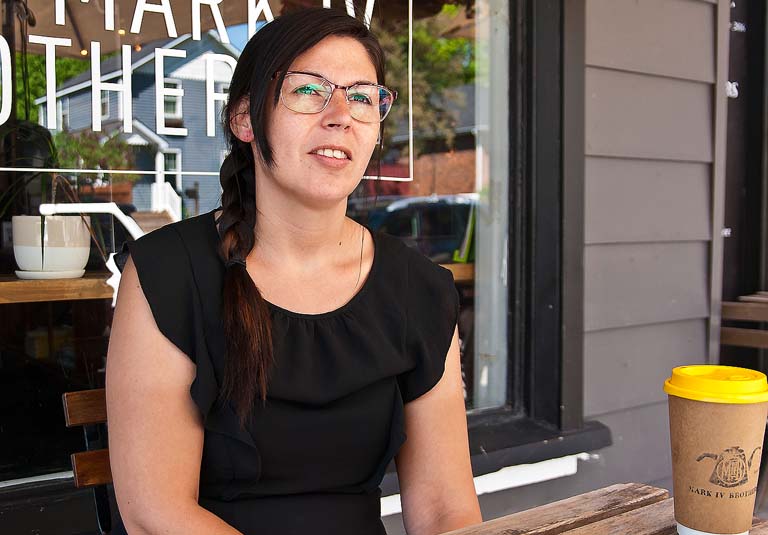
“Take gravel for example. That part of the issue, they’re extracting gravel from the pit, but they are using water to wash the gravel. What’s most disturbing about that is here in Ontario we extract 13 times the amount of gravel we actually consume. There’s no need for that. There’s three water permits that are waiting to approved right now with the townships to use that water to wash more gravel. It’s so infuriating. Adam Chambers, he’s awesome, he has endorsed the House of Commons petition to put a 5 year moratorium on that water so we can further study. This water has been labeled the gold standard of water across the world. That gravel they are extracting is likely the filtration source that we have in the world’s purest water. All of the local wells in the area are on the same water table; it’s affecting their well water; that water is changing too.”
“When they first started studying this water, they thought their equipment was broken. They went back and studied again and they couldn’t believe what they were seeing on their equipment. It’s been peer reviewed by 50 (other) studies. When they first started testing the water, it was that pure. There was absolutely no evidence of human fingerprints in that water.”
The Last Word
Brooks’s issue to offer is not like any issue on the landscape in media. It’s the electorate. She thinks things have become so bad, more people don’t care about participating in elections in any form – and it’s a sad, missed opportunity voters are throwing away.
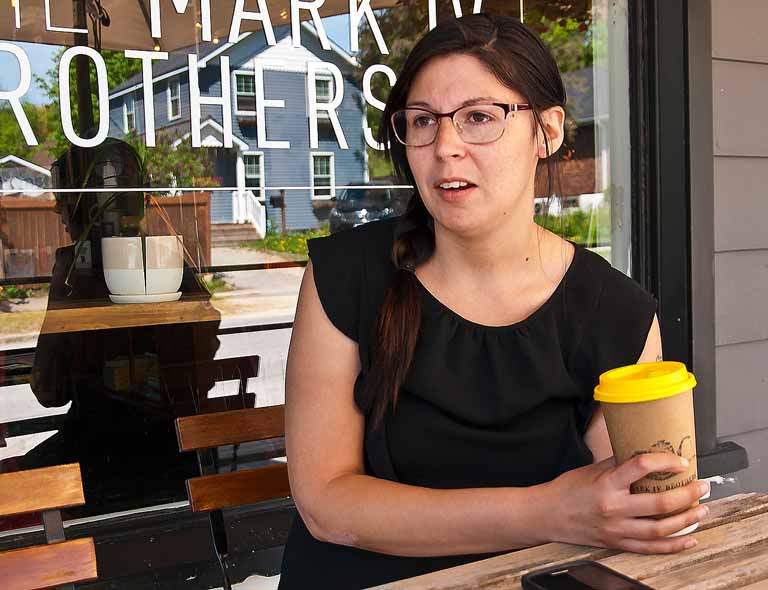
“I think a big thing is voter apathy. I think a lot of damage has been done in the last few years. So many people don’t trust the government at all, to the point where they are not even willing to listen to the candidates here in Simcoe North. I think that’s really sad.”
“These are good people that are trying to make a difference and we demand more and better from our politicians, when we do have politicians that are brand new and really want to make a difference.”
“Every single party, there’s holes to poke., No one party has the end all, be all solutions for all of our problems.”
“They don’t even want to hear or get to know their candidates and it’s sad because they are the same people are demanding better from our politicians. When they do get different, which they want different, they won’t give that a chance. It’s very frustrating.”
(Photos by Swartz – SUNonline/Orillia) Main: Simcoe North Green Party of Ontario candidate Krystal Brooks.
Other Candidate Profiles:

